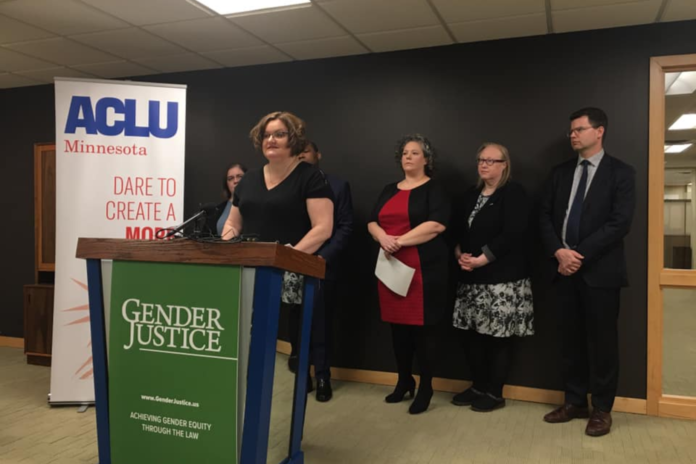The Minnesota Court of Appeals ruled Monday that public schools must allow transgender students to use the locker rooms of their choice in accordance with the Minnesota Human Rights Act.
The Minnesota Department of Human Rights called the decision a “landmark” ruling and “powerful opinion” in a statement released Monday.
“This decision means that schools are now safer and more welcoming for transgender and gender nonconforming students across Minnesota,” said Minnesota Department of Human Rights Deputy Commissioner Irina Vaynerman. “Our state was the first in the nation to prohibit gender identity discrimination. Today’s decision honors that legacy and continues to build a more equitable and inclusive Minnesota.”
At the center of the case is a former Coon Rapids High School student, referred to as N.H. in legal documents, who was born female and now identifies as a male. N.H. joined the boys’ swim team during the 2015-16 school year and used the boys’ locker room without incident. But the following school year, the Anoka-Hennepin School District required N.H. to use an “enhanced privacy” changing area adjacent to the main boys’ locker room.
The school district then informed J.H., N.H.’s mother, that her child would be disciplined for continuing to use the main boys’ locker room.
J.H. sued the school district in February 2019 with the legal assistance of Gender Justice and the American Civil Liberties Union of Minnesota, and the Minnesota Department of Human Rights was permitted to join the lawsuit six months later.
A district court judge rejected the school district’s motion to dismiss the case and forwarded it to the appeals court, which ruled Monday that the district violated the Minnesota Constitution’s equal protection clause as well as the Minnesota Human Rights Act.
Applying the “plain language” of the Human Rights Act’s education provision, Judge Peter Reyes wrote that “requiring a transgender student to use a different locker room because of his sexual orientation is discrimination.”
“It is difficult to imagine how requiring only the transgender student to use a separate locker room would not stigmatize that student,” Reyes said in the ruling.
In a dissenting opinion, Judge Matthew Johnson said the school district was “in a difficult situation when it was asked to accommodate the gender-identity needs of N.H.”
“The school district’s locker rooms were designed and built according to the long-standing tradition in which users are separated by sex. N.H. wanted to use a locker room that did not align with the sex he was assigned at birth but aligned with his gender identity. There was a lack of caselaw as to whether a transgender high school student has a right to use the locker room of his or her choice. There were only non-binding statements of administrative agencies,” wrote Johnson.
“But none of those administrative agencies recommended what this court’s opinion requires — that school districts allow transgender students to shower and change clothes alongside cisgender students in multiple-user locker rooms, even if the transgender students and the cisgender students are anatomically different,” he continued.
The ACLU and Gender Justice celebrated the ruling as a “critical victory” in the fight for “safe schools for every trans student.”
“It is shameful that Anoka Hennepin School District had to be sued once again over its discrimination against LGBTQ students,” ACLU-MN staff attorney David McKinney said in a press release. “Hopefully, the district will now do the right thing and embrace transgender-inclusive policies, rather than ostracizing students and depriving them of equal access to education.”

















